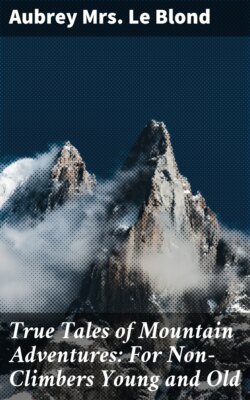Читать книгу True Tales of Mountain Adventures: For Non-Climbers Young and Old - Aubrey Mrs. Le Blond - Страница 3
На сайте Литреса книга снята с продажи.
PREFACE
ОглавлениеTable of Contents
There is no manlier sport in the world than mountaineering.
It is true that all the sports Englishmen take part in are manly, but mountaineering is different from others, because it is sport purely for the sake of sport. There is no question of beating any one else, as in a race or a game, or of killing an animal or a bird as in hunting or shooting. A mountaineer sets his skill and his strength against the difficulty of getting to the top of a steep peak. Either he conquers the mountain, or it conquers him. If he fails, he keeps on trying till he succeeds. This teaches him perseverance, and proves to him that anything is possible if he is determined to do it.
In mountaineering, all the party share the pleasures and the dangers. Every climber has to help the others. Every climber has to rely both on himself and on his companions.
Mountaineering makes a person quick in learning how to act in moments of danger. It cultivates his presence of mind, it teaches him to be unselfish and thoughtful for others who may be with him. It takes him amongst the grandest scenery in the world, it shows him the forces of nature let loose in the blinding snow-storm, or the roaring avalanche. It lifts him above all the petty friction of daily life, and takes him where the atmosphere is always pure, and the outlook calm and wide. It brings him health, and leaves him delightful recollections. It gives him friends both amongst his fellow-climbers, and in the faithful guides who season after season accompany him. It is a pursuit which he can commence early in life, and continue till old age, for the choice of expeditions is endless, and ascents of all scales of difficulty and of any length are easily found.
That I do not exaggerate the joys and the benefits of mountaineering will be borne out by those extracts from the true tales from the hills of which this book chiefly consists. Some may think I have dwelt at undue length on the catastrophes which have darkened the pages of Alpine history. I do not apologize. If in one single instance any one who reads these pages becomes afterwards a climber, and takes warning from anything I have told him, I am amply justified.
It has been difficult in a work like this to know always what to include and what to omit. My guiding principle has been to give preference to descriptions which are either so exciting by reason of the facts narrated, or else so brilliantly and wittily written, that they cannot fail to excite the reader's interest. To these I have added four chapters, those on mountaineering, on glaciers, on avalanches, and on the guides of the Alps, which may help to make climbing more intelligible to those who have never attempted it.
My warm thanks are due to Sir Leslie Stephen, Messrs Whymper, Tuckett, Charles Pilkington, and Clinton Dent who have rendered the production of this book possible by allowing me to quote at considerable length from their writings; also to Messrs Longman who have permitted me to make extracts from works of which they hold the copyright, and to Messrs Newnes and Messrs Hutchinson for their kind permission to re-print portions of my articles which have appeared in their publications.
I am also under a debt of gratitude to Mr Philip Gosset, who has not only allowed me to reprint his account of the avalanche on the Haut-de-Cry, but has also most kindly placed his wide knowledge of glaciers at my disposal by offering to revise the chapter I have written on that subject in this book.
Dr Kennedy, whose beautiful edition of Mr Moore's diary, "The Alps in 1864," recently appeared, has generously given me permission to make any extracts I desire from it.
Colonel Arkwright, whose brother perished on Mont Blanc in 1866, has been good enough to allow me to reproduce a most interesting and hitherto unpublished photograph of the relics discovered in 1897.
The illustrations, except those connected with the Arkwright accident, and a view of the Matterhorn, by the late Mr W. F. Donkin, are from photographs by me. By them I have tried rather to show how climbers carry out their mountaineering than to illustrate any particular locality.
In my own writings I have adopted, in the spelling of names of places, the modern official forms, but, of course, when quoting I have kept to those followed by each writer.
If, in the following pages, I have given any pleasure to those who have never scaled a peak, or have perhaps recalled happy days amongst the mountains to a fellow-climber, it will be a very real gratification to me.
E. LE BLOND.
67, The Drive,
Brighton, Oct. 30th, 1902.
